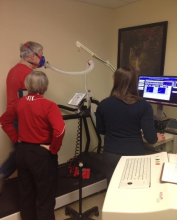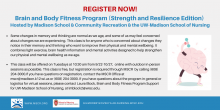
For the weekly Brain’s Resilience And Intelligence Networks (BRAIN) international lecture series, Ozioma Okonkwo, PhD, shared an overview of his research into physical fitness, exercise, and Alzheimer’s disease progression.
The lecture series emphasizes research in cognitive resilience and neuroimaging and seeks to illuminate the structural and functional networks that form the basis of resilience, which Okonkwo defined as the brain’s capacity for maintaining normal functioning despite the presence of pathology. In his talk “Resilience through the Fitness...












